

Literary Criticism
- Introduction
- Literary Theories
- Steps to Literary Criticism
- Find Resources
- Cite Sources
- thesis examples
SAMPLE THESIS STATEMENTS
These sample thesis statements are provided as guides, not as required forms or prescriptions.
______________________________________________________________________________________________________________
The thesis may focus on an analysis of one of the elements of fiction, drama, poetry or nonfiction as expressed in the work: character, plot, structure, idea, theme, symbol, style, imagery, tone, etc.
In “A Worn Path,” Eudora Welty creates a fictional character in Phoenix Jackson whose determination, faith, and cunning illustrate the indomitable human spirit.
Note that the work, author, and character to be analyzed are identified in this thesis statement. The thesis relies on a strong verb (creates). It also identifies the element of fiction that the writer will explore (character) and the characteristics the writer will analyze and discuss (determination, faith, cunning).
Further Examples:
The character of the Nurse in Romeo and Juliet serves as a foil to young Juliet, delights us with her warmth and earthy wit, and helps realize the tragic catastrophe.
The works of ecstatic love poets Rumi, Hafiz, and Kabir use symbols such as a lover’s longing and the Tavern of Ruin to illustrate the human soul’s desire to connect with God.
The thesis may focus on illustrating how a work reflects the particular genre’s forms, the characteristics of a philosophy of literature, or the ideas of a particular school of thought.
“The Third and Final Continent” exhibits characteristics recurrent in writings by immigrants: tradition, adaptation, and identity.
Note how the thesis statement classifies the form of the work (writings by immigrants) and identifies the characteristics of that form of writing (tradition, adaptation, and identity) that the essay will discuss.
Further examples:
Samuel Beckett’s Endgame reflects characteristics of Theatre of the Absurd in its minimalist stage setting, its seemingly meaningless dialogue, and its apocalyptic or nihilist vision.
A close look at many details in “The Story of an Hour” reveals how language, institutions, and expected demeanor suppress the natural desires and aspirations of women.
The thesis may draw parallels between some element in the work and real-life situations or subject matter: historical events, the author’s life, medical diagnoses, etc.
In Willa Cather’s short story, “Paul’s Case,” Paul exhibits suicidal behavior that a caring adult might have recognized and remedied had that adult had the scientific knowledge we have today.
This thesis suggests that the essay will identify characteristics of suicide that Paul exhibits in the story. The writer will have to research medical and psychology texts to determine the typical characteristics of suicidal behavior and to illustrate how Paul’s behavior mirrors those characteristics.
Through the experience of one man, the Narrative of the Life of Frederick Douglass, An American Slave, accurately depicts the historical record of slave life in its descriptions of the often brutal and quixotic relationship between master and slave and of the fragmentation of slave families.
In “I Stand Here Ironing,” one can draw parallels between the narrator’s situation and the author’s life experiences as a mother, writer, and feminist.
SAMPLE PATTERNS FOR THESES ON LITERARY WORKS
1. In (title of work), (author) (illustrates, shows) (aspect) (adjective).
Example: In “Barn Burning,” William Faulkner shows the characters Sardie and Abner Snopes struggling for their identity.
2. In (title of work), (author) uses (one aspect) to (define, strengthen, illustrate) the (element of work).
Example: In “Youth,” Joseph Conrad uses foreshadowing to strengthen the plot.
3. In (title of work), (author) uses (an important part of work) as a unifying device for (one element), (another element), and (another element). The number of elements can vary from one to four.
Example: In “Youth,” Joseph Conrad uses the sea as a unifying device for setting, structure and theme.
4. (Author) develops the character of (character’s name) in (literary work) through what he/she does, what he/she says, what other people say to or about him/her.
Example: Langston Hughes develops the character of Semple in “Ways and Means”…
5. In (title of work), (author) uses (literary device) to (accomplish, develop, illustrate, strengthen) (element of work).
Example: In “The Masque of the Red Death,” Poe uses the symbolism of the stranger, the clock, and the seventh room to develop the theme of death.
6. (Author) (shows, develops, illustrates) the theme of __________ in the (play, poem, story).
Example: Flannery O’Connor illustrates the theme of the effect of the selfishness of the grandmother upon the family in “A Good Man is Hard to Find.”
7. (Author) develops his character(s) in (title of work) through his/her use of language.
Example: John Updike develops his characters in “A & P” through his use of figurative language.
Perimeter College, Georgia State University, http://depts.gpc.edu/~gpcltc/handouts/communications/literarythesis.pdf
- << Previous: Cite Sources
- Next: Get Help >>
- Last Updated: May 10, 2024 3:27 PM
- URL: https://libguides.uta.edu/literarycriticism
University of Texas Arlington Libraries 702 Planetarium Place · Arlington, TX 76019 · 817-272-3000
- Internet Privacy
- Accessibility
- Problems with a guide? Contact Us.
Thesis Statements for a Literature Assignment
A thesis prepares the reader for what you are about to say. As such, your paper needs to be interesting in order for your thesis to be interesting. Your thesis needs to be interesting because it needs to capture a reader's attention. If a reader looks at your thesis and says "so what?", your thesis has failed to do its job, and chances are your paper has as well. Thus, make your thesis provocative and open to reasonable disagreement, but then write persuasively enough to sway those who might be disagree.
Keep in mind the following when formulating a thesis:
- A Thesis Should Not State the Obvious
- Use Literary Terms in Thesis With Care
- A Thesis Should be Balanced
- A Thesis Can be a Blueprint
Avoid the Obvious
Bland: Dorothy Parker's "Résumé" uses images of suicide to make her point about living.
This is bland because it's obvious and incontestable. A reader looks at it and says, "so what?"
However, consider this alternative:
Dorothy Parker's "Résumé" doesn't celebrate life, but rather scorns those who would fake or attempt suicide just to get attention.
The first thesis merely describes something about the poem; the second tells the reader what the writer thinks the poem is about--it offers a reading or interpretation. The paper would need to support that reading and would very likely examine the way Parker uses images of suicide to make the point the writer claims.
Use Literary Terms in Thesis Only to Make Larger Points
Poems and novels generally use rhyme, meter, imagery, simile, metaphor, stanzas, characters, themes, settings and so on. While these terms are important for you to use in your analysis and your arguments, that they exist in the work you are writing about should not be the main point of your thesis. Unless the poet or novelist uses these elements in some unexpected way to shape the work's meaning, it's generally a good idea not to draw attention to the use of literary devices in thesis statements because an intelligent reader expects a poem or novel to use literary of these elements. Therefore, a thesis that only says a work uses literary devices isn't a good thesis because all it is doing is stating the obvious, leading the reader to say, "so what?"
However, you can use literary terms in a thesis if the purpose is to explain how the terms contribute to the work's meaning or understanding. Here's an example of thesis statement that does call attention to literary devices because they are central to the paper's argument. Literary terms are placed in italics.
Don Marquis introduced Archy and Mehitabel in his Sun Dial column by combining the conventions of free verse poetry with newspaper prose so intimately that in "the coming of Archy," the entire column represents a complete poem and not a free verse poem preceded by a prose introduction .
Note the difference between this thesis and the first bland thesis on the Parker poem. This thesis does more than say certain literary devices exist in the poem; it argues that they exist in a specific relationship to one another and makes a fairly startling claim, one that many would disagree with and one that the writer will need to persuade her readers on.
Keep Your Thesis Balanced
Keep the thesis balanced. If it's too general, it becomes vague; if it's too specific, it cannot be developed. If it's merely descriptive (like the bland example above), it gives the reader no compelling reason to go on. The thesis should be dramatic, have some tension in it, and should need to be proved (another reason for avoiding the obvious).
Too general: Edna St. Vincent Millay wrote many poems with love as the theme. Too specific: Edna St. Vincent Millay wrote "Love is not all: it is not meat nor drink" in <insert date> after <insert event from her life>. Too descriptive: Edna St. Vincent Millay's "Love is not all: it is not meat nor drink" is a sonnet with two parts; the first six lines propose a view of love and the next eight complicate that view. With tension and which will need proving: Despite her avowal on the importance of love, and despite her belief that she would not sell her love, the speaker in Edna St. Vincent Millay's "Love is not all: it is not meat nor drink" remains unconvinced and bitter, as if she is trying to trick herself into believing that love really does matter for more than the one night she is in some lover's arms.
Your Thesis Can Be A Blueprint
A thesis can be used as roadmap or blueprint for your paper:
In "Résumé," Dorothy Parker subverts the idea of what a résumé is--accomplishments and experiences--with an ironic tone, silly images of suicide, and witty rhymes to point out the banality of life for those who remain too disengaged from it.
Note that while this thesis refers to particular poetic devices, it does so in a way that gets beyond merely saying there are poetic devices in the poem and then merely describing them. It makes a claim as to how and why the poet uses tone, imagery and rhyme.
Readers would expect you to argue that Parker subverts the idea of the résumé to critique bored (and boring) people; they would expect your argument to do so by analyzing her use of tone, imagery and rhyme in that order.
Citation Information
Nick Carbone. (1994-2024). Thesis Statements for a Literature Assignment. The WAC Clearinghouse. Colorado State University. Available at https://wac.colostate.edu/repository/writing/guides/.
Copyright Information
Copyright © 1994-2024 Colorado State University and/or this site's authors, developers, and contributors . Some material displayed on this site is used with permission.

Thesis Statements for a Literature Assignment
A thesis prepares the reader for what you are about to say. As such, your paper needs to be interesting in order for your thesis to be interesting. Your thesis needs to be interesting because it needs to capture a reader's attention. If a reader looks at your thesis and says "so what?", your thesis has failed to do its job, and chances are your paper has as well. Thus, make your thesis provocative and open to reasonable disagreement, but then write persuasively enough to sway those who might be disagree.
Keep in mind the following when formulating a thesis:
- A Thesis Should Not State the Obvious
- Use Literary Terms in Thesis With Care
- A Thesis Should be Balanced
- A Thesis Can be a Blueprint
Avoid the Obvious
Bland: Dorothy Parker's "Résumé" uses images of suicide to make her point about living.
This is bland because it's obvious and incontestable. A reader looks at it and says, "so what?"
However, consider this alternative:
Dorothy Parker's "Résumé" doesn't celebrate life, but rather scorns those who would fake or attempt suicide just to get attention.
The first thesis merely describes something about the poem; the second tells the reader what the writer thinks the poem is about--it offers a reading or interpretation. The paper would need to support that reading and would very likely examine the way Parker uses images of suicide to make the point the writer claims.
Use Literary Terms in Thesis Only to Make Larger Points
Poems and novels generally use rhyme, meter, imagery, simile, metaphor, stanzas, characters, themes, settings and so on. While these terms are important for you to use in your analysis and your arguments, that they exist in the work you are writing about should not be the main point of your thesis. Unless the poet or novelist uses these elements in some unexpected way to shape the work's meaning, it's generally a good idea not to draw attention to the use of literary devices in thesis statements because an intelligent reader expects a poem or novel to use literary of these elements. Therefore, a thesis that only says a work uses literary devices isn't a good thesis because all it is doing is stating the obvious, leading the reader to say, "so what?"
However, you can use literary terms in a thesis if the purpose is to explain how the terms contribute to the work's meaning or understanding. Here's an example of thesis statement that does call attention to literary devices because they are central to the paper's argument. Literary terms are placed in italics.
Don Marquis introduced Archy and Mehitabel in his Sun Dial column by combining the conventions of free verse poetry with newspaper prose so intimately that in "the coming of Archy," the entire column represents a complete poem and not a free verse poem preceded by a prose introduction .
Note the difference between this thesis and the first bland thesis on the Parker poem. This thesis does more than say certain literary devices exist in the poem; it argues that they exist in a specific relationship to one another and makes a fairly startling claim, one that many would disagree with and one that the writer will need to persuade her readers on.
Keep Your Thesis Balanced
Keep the thesis balanced. If it's too general, it becomes vague; if it's too specific, it cannot be developed. If it's merely descriptive (like the bland example above), it gives the reader no compelling reason to go on. The thesis should be dramatic, have some tension in it, and should need to be proved (another reason for avoiding the obvious).
Too general: Edna St. Vincent Millay wrote many poems with love as the theme. Too specific: Edna St. Vincent Millay wrote "Love is not all: it is not meat nor drink" in <insert date> after <insert event from her life>. Too descriptive: Edna St. Vincent Millay's "Love is not all: it is not meat nor drink" is a sonnet with two parts; the first six lines propose a view of love and the next eight complicate that view. With tension and which will need proving: Despite her avowal on the importance of love, and despite her belief that she would not sell her love, the speaker in Edna St. Vincent Millay's "Love is not all: it is not meat nor drink" remains unconvinced and bitter, as if she is trying to trick herself into believing that love really does matter for more than the one night she is in some lover's arms.
Your Thesis Can Be A Blueprint
A thesis can be used as roadmap or blueprint for your paper:
In "Résumé," Dorothy Parker subverts the idea of what a résumé is--accomplishments and experiences--with an ironic tone, silly images of suicide, and witty rhymes to point out the banality of life for those who remain too disengaged from it.
Note that while this thesis refers to particular poetic devices, it does so in a way that gets beyond merely saying there are poetic devices in the poem and then merely describing them. It makes a claim as to how and why the poet uses tone, imagery and rhyme.
Readers would expect you to argue that Parker subverts the idea of the résumé to critique bored (and boring) people; they would expect your argument to do so by analyzing her use of tone, imagery and rhyme in that order.
Carbone, Nick. (1997). Thesis Statements for a Literature Assignment. Writing@CSU . Colorado State University. https://writing.colostate.edu/guides/guide.cfm?guideid=51

Literary Analysis Essay
Literary analysis essay generator.

Literary analysis essays offer a deeper understanding and interpretation of literary works, allowing readers to delve into the intricacies of a story, poem, or novel. Whether you’re a student or a literature enthusiast, analyzing literature can be a rewarding experience. In this article, we will explore a collection of 30+ literary analysis essay examples available in Word, Google Docs, and PDF formats. We will also discuss essential elements such as analysis paper outlines , literary devices, short story analysis, literature reviews, theses, analogies, book reviews, context, and conclusions.
1. Literary Analysis Essay Outline Example
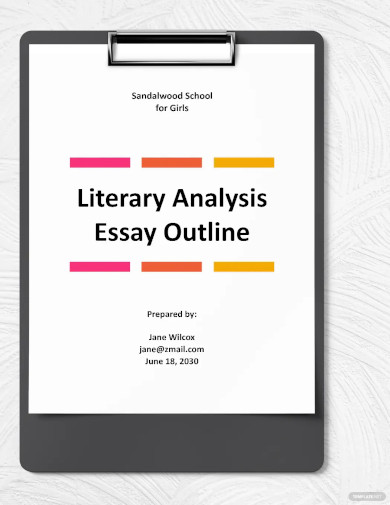
- Google Docs
2. Quotation Literary Analysis Essay Example
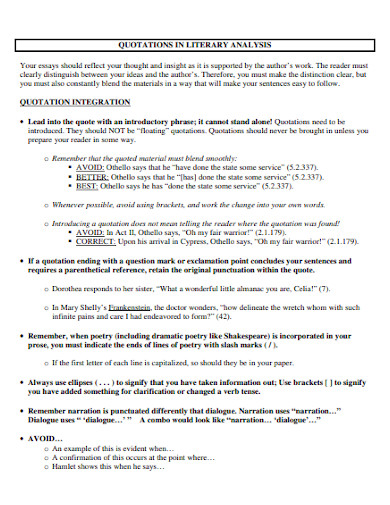
Size: 33 KB
3. Printable Literary Analysis Essay Example
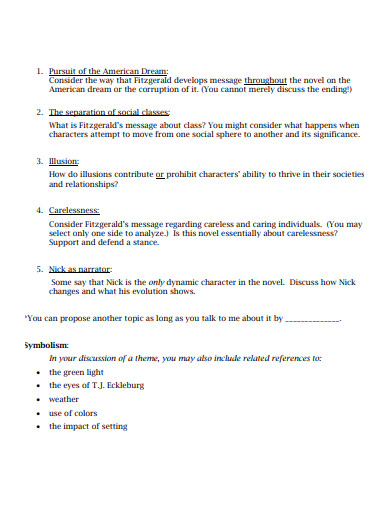
Size: 252 KB
4. Building a Literary Analysis Essay Example
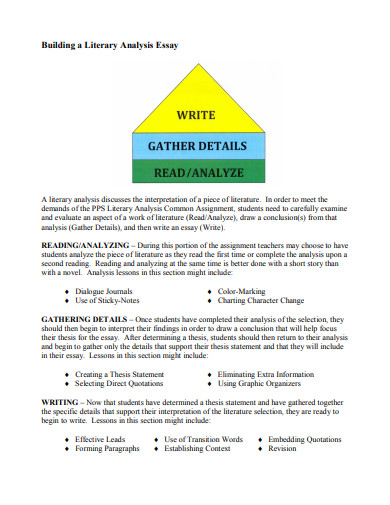
Size: 195 KB
5. Literary Analysis Essay Score Sheet Example
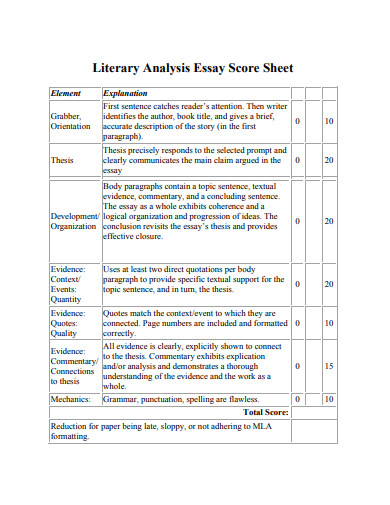
Size: 81 KB
6. Sample Literary Analysis Essay Example
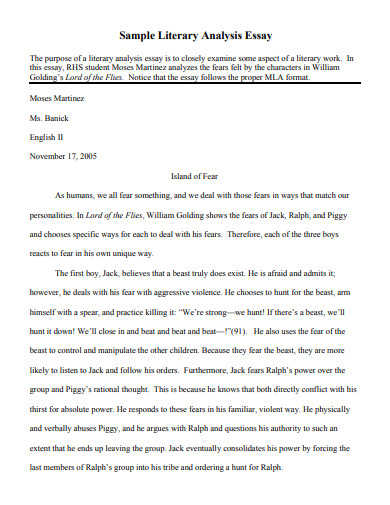
Size: 63 KB
7. Literary Analysis Essay Checklist Example
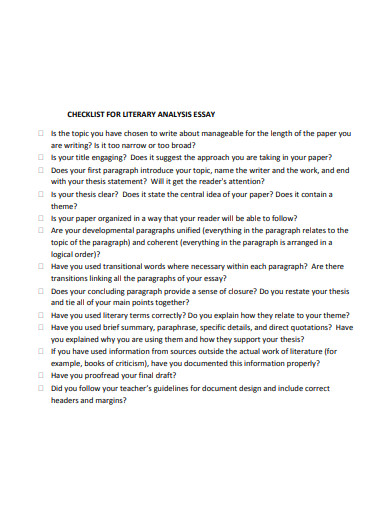
Size: 180 KB
8. Literary Analysis Essay Outline Example
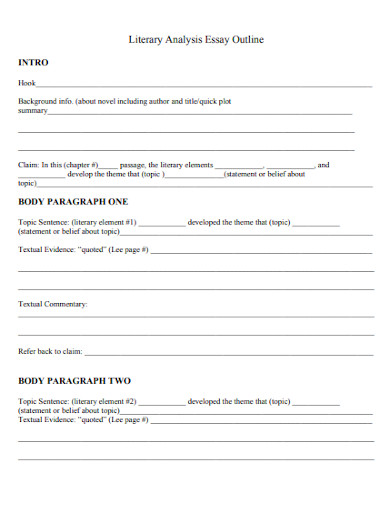
Size: 51 KB
9. Editable Literary Analysis Essay Example
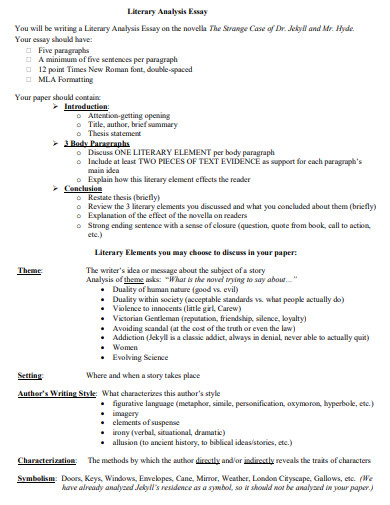
Size: 336 KB
10. Peer Editing Literary Analysis Essay Example
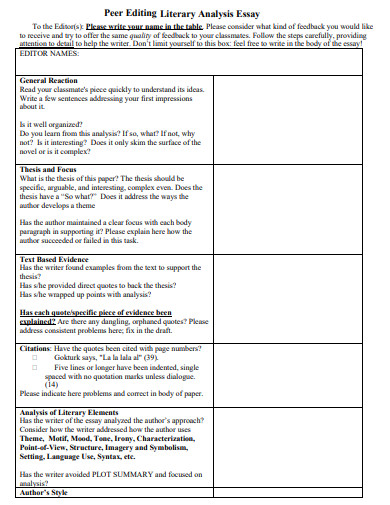
Size: 226 KB
11. Professional Literary Analysis Essay Example
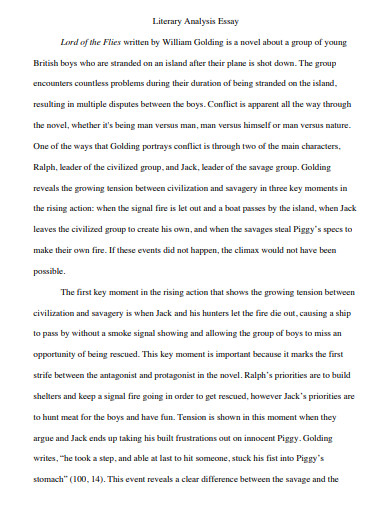
Size: 41 KB
12. Literary Analysis Assessment Outline Essay Example
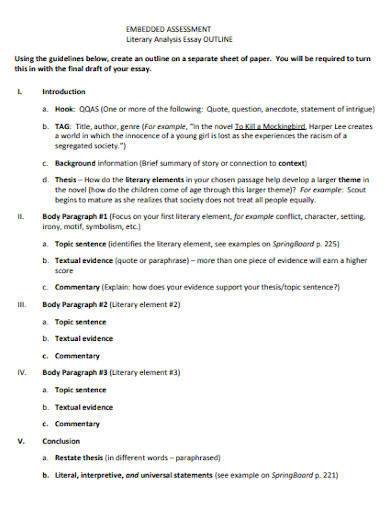
Size: 61 KB
13. High School Literary Analysis Essay Example
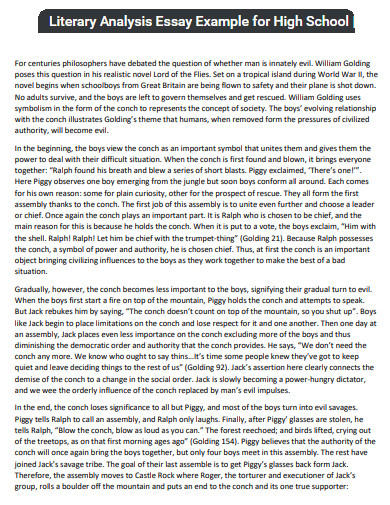
Size: 95 KB
14. Evaluation of a Literary Analysis Essay Example
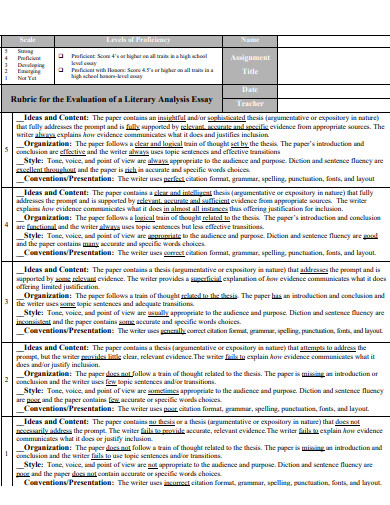
Size: 22 KB
15. Graphic Organizer Literary Analysis Essay Example
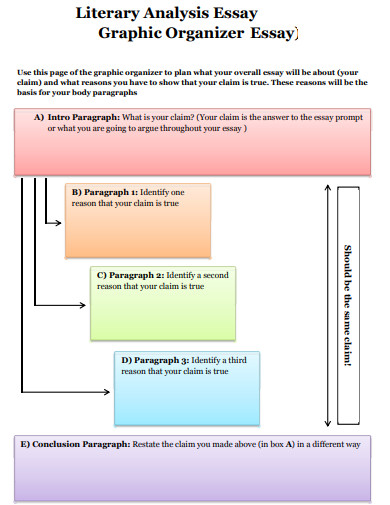
Size: 306 KB
16. Literary Analysis Essay Structure Example
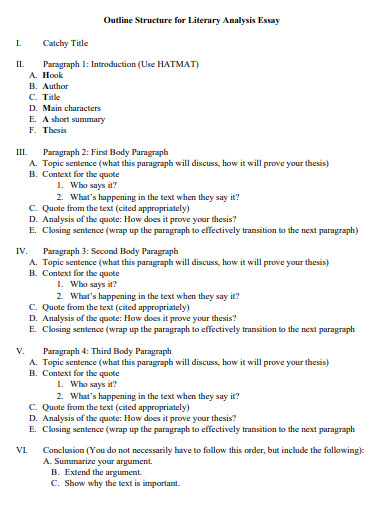
Size: 178 KB
17. Literary Analysis Essay Writing Example
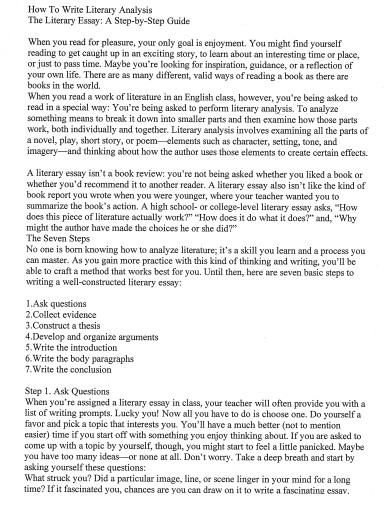
18. College Literary Analysis Essay Example
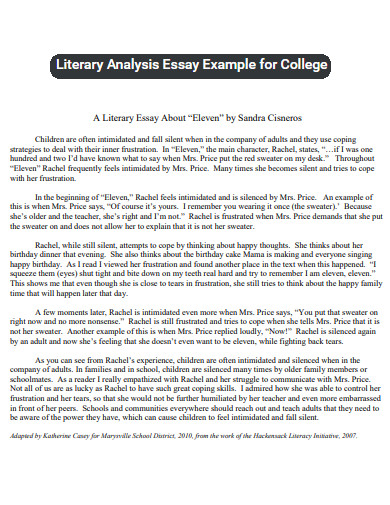
Size: 468 KB
19. Literary Analysis Essay Rubic Example
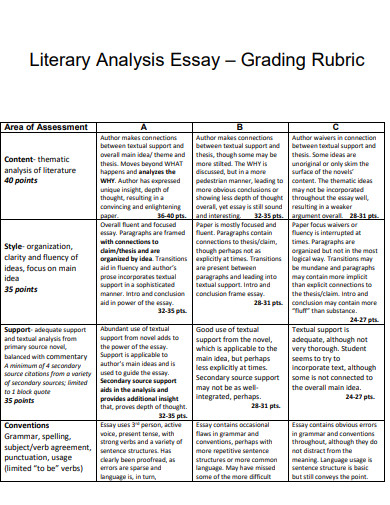
Size: 644 KB
20. Simple Literary Analysis Essay Example
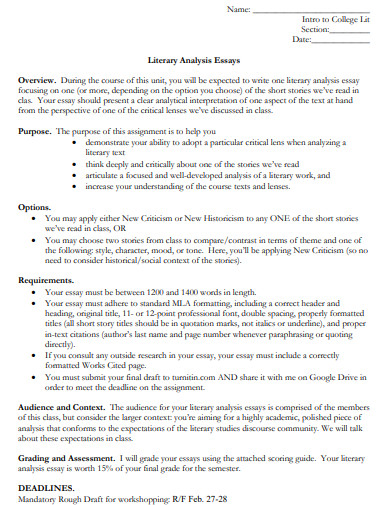
Size: 88 KB
21. Writing a Literary Analysis Essay Example
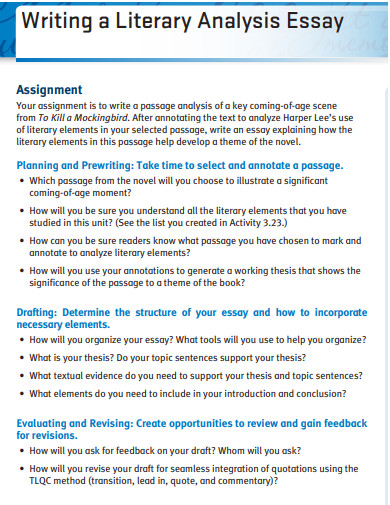
Size: 500 KB
22. Introduction to Literary Analysis Essay Example
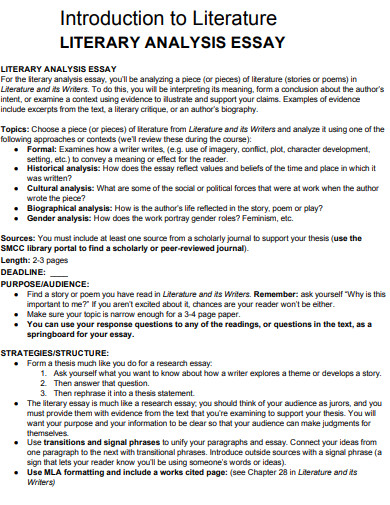
Size: 368 KB
23. Short Story Literary Analysis Essay Example
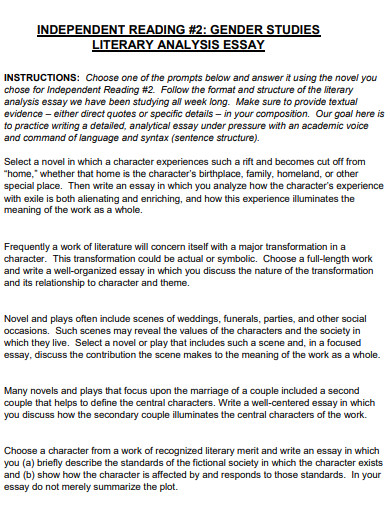
Size: 103 KB
24. 8th Grade Literary Analysis Essay Example
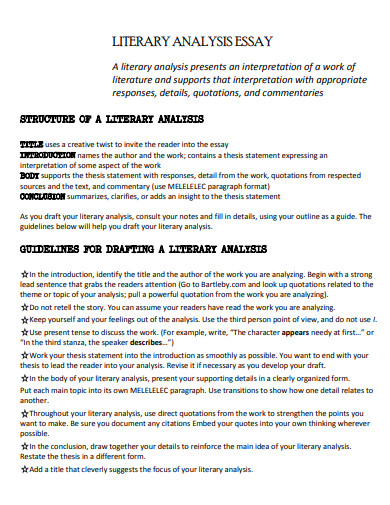
Size: 278 KB
25. Literary Analysis Essay Assignment Example
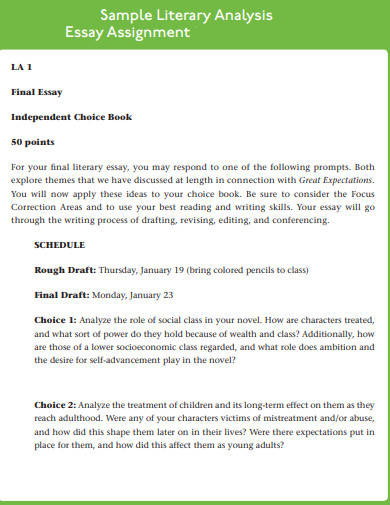
Size: 47 KB
26. Literary Analysis Video Essay Example
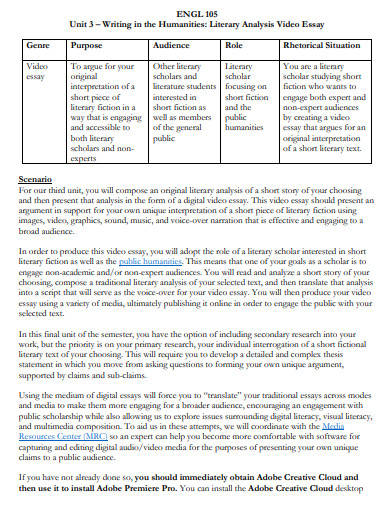
Size: 208 KB
27. Student Guide for Literary Analysis Essay Example
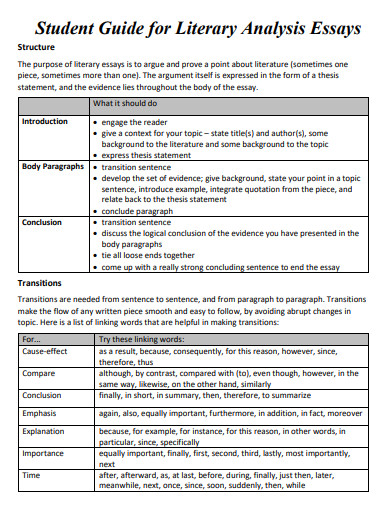
Size: 956 KB
28. MLA Literary Analysis Essay Example
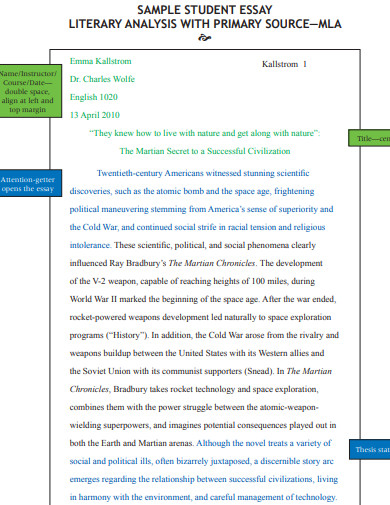
Size: 116 KB
29. Draft Literary Analysis Essay Example
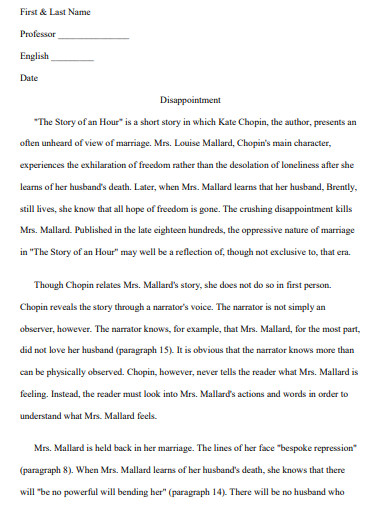
Size: 112 KB
30. 9th Grade Literary Analysis Essay Example
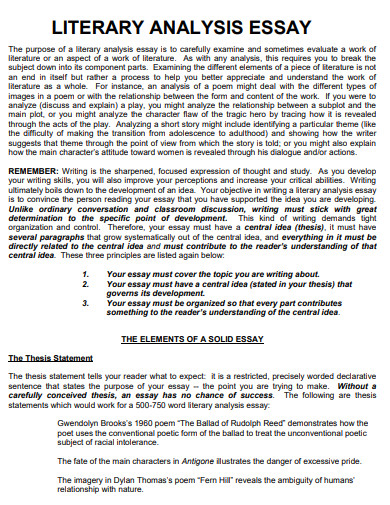
Size: 93 KB
31. Literary Analysis Essay Guide Example
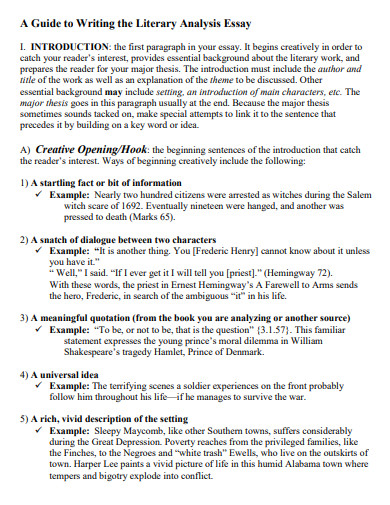
Size: 36 KB
What is a Literary Analysis Essay?
A literary analysis essay is a critical examination and interpretation of a literary work. It involves analyzing various elements such as plot, characters, themes, and literary devices to uncover deeper meanings and insights. By dissecting the text and exploring its nuances, readers can gain a deeper appreciation for the author’s intentions and the work’s impact. A well-written literary analysis essay provides a comprehensive analysis that goes beyond surface-level observations.
How to Write a Literary Analysis Essay
Before we dive into the examples, let’s outline the steps involved in writing a literary analysis essay:
Step 1: Choose a literary work:
Select a literary work that you want to analyze. It could be a novel, short story, poem, or play. Ensure that the chosen work is rich in literary elements and offers ample material for analysis.
Step 2: Familiarize yourself with the work:
Read the literary work carefully, taking note of important plot points, characters, themes, and literary devices. Pay attention to the author’s writing style and the overall tone of the work.
Step 3: Develop a thesis statement:
Craft a strong thesis statement that encapsulates your main argument or interpretation of the literary work. Your thesis should be clear, concise, and debatable, providing a roadmap for your analysis.
Step 4: Gather evidence:
Collect evidence from the literary work to support your thesis statement. Look for specific examples, quotes, and literary devices that reinforce your analysis. Take note of the context in which these elements appear.
Step 5: Organize your essay:
Create an analysis paper outline to structure your essay effectively. Divide your essay into introduction, body paragraphs, and conclusion . Each body paragraph should focus on a specific aspect of your analysis, supported by evidence.
Step 6: Write your essay:
Start with an engaging introduction that provides background information and introduces your thesis statement. In the body paragraphs, analyze different aspects of the literary work, providing evidence and explanations. Ensure a smooth flow between paragraphs. Conclude your essay by summarizing your main points and reinforcing your thesis .
What are some examples of literary devices?
Literary devices are techniques used by authors to enhance their writing and convey meaning. Examples include metaphors, similes, personification, alliteration, and symbolism. For a comprehensive list and explanations, refer to Literary Devices .
Are there any specific examples of short story analysis essays?
You can find examples of short story analysis essays in PDF format here . These examples provide insights into analyzing the elements of a short story effectively.
How does context impact literary analysis?
Context plays a crucial role in literary analysis as it helps readers understand the historical, social, and cultural background in which the literary work was written. It provides insights into the author’s intentions and influences the interpretation of the text.
Text prompt
- Instructive
- Professional
Analyze the theme of courage in a novel for your Literary Analysis Essay.
Write about the use of symbolism in a short story for your Literary Analysis Essay.

Thesis Statements
What this handout is about.
This handout describes what a thesis statement is, how thesis statements work in your writing, and how you can craft or refine one for your draft.
Introduction
Writing in college often takes the form of persuasion—convincing others that you have an interesting, logical point of view on the subject you are studying. Persuasion is a skill you practice regularly in your daily life. You persuade your roommate to clean up, your parents to let you borrow the car, your friend to vote for your favorite candidate or policy. In college, course assignments often ask you to make a persuasive case in writing. You are asked to convince your reader of your point of view. This form of persuasion, often called academic argument, follows a predictable pattern in writing. After a brief introduction of your topic, you state your point of view on the topic directly and often in one sentence. This sentence is the thesis statement, and it serves as a summary of the argument you’ll make in the rest of your paper.
What is a thesis statement?
A thesis statement:
- tells the reader how you will interpret the significance of the subject matter under discussion.
- is a road map for the paper; in other words, it tells the reader what to expect from the rest of the paper.
- directly answers the question asked of you. A thesis is an interpretation of a question or subject, not the subject itself. The subject, or topic, of an essay might be World War II or Moby Dick; a thesis must then offer a way to understand the war or the novel.
- makes a claim that others might dispute.
- is usually a single sentence near the beginning of your paper (most often, at the end of the first paragraph) that presents your argument to the reader. The rest of the paper, the body of the essay, gathers and organizes evidence that will persuade the reader of the logic of your interpretation.
If your assignment asks you to take a position or develop a claim about a subject, you may need to convey that position or claim in a thesis statement near the beginning of your draft. The assignment may not explicitly state that you need a thesis statement because your instructor may assume you will include one. When in doubt, ask your instructor if the assignment requires a thesis statement. When an assignment asks you to analyze, to interpret, to compare and contrast, to demonstrate cause and effect, or to take a stand on an issue, it is likely that you are being asked to develop a thesis and to support it persuasively. (Check out our handout on understanding assignments for more information.)
How do I create a thesis?
A thesis is the result of a lengthy thinking process. Formulating a thesis is not the first thing you do after reading an essay assignment. Before you develop an argument on any topic, you have to collect and organize evidence, look for possible relationships between known facts (such as surprising contrasts or similarities), and think about the significance of these relationships. Once you do this thinking, you will probably have a “working thesis” that presents a basic or main idea and an argument that you think you can support with evidence. Both the argument and your thesis are likely to need adjustment along the way.
Writers use all kinds of techniques to stimulate their thinking and to help them clarify relationships or comprehend the broader significance of a topic and arrive at a thesis statement. For more ideas on how to get started, see our handout on brainstorming .
How do I know if my thesis is strong?
If there’s time, run it by your instructor or make an appointment at the Writing Center to get some feedback. Even if you do not have time to get advice elsewhere, you can do some thesis evaluation of your own. When reviewing your first draft and its working thesis, ask yourself the following :
- Do I answer the question? Re-reading the question prompt after constructing a working thesis can help you fix an argument that misses the focus of the question. If the prompt isn’t phrased as a question, try to rephrase it. For example, “Discuss the effect of X on Y” can be rephrased as “What is the effect of X on Y?”
- Have I taken a position that others might challenge or oppose? If your thesis simply states facts that no one would, or even could, disagree with, it’s possible that you are simply providing a summary, rather than making an argument.
- Is my thesis statement specific enough? Thesis statements that are too vague often do not have a strong argument. If your thesis contains words like “good” or “successful,” see if you could be more specific: why is something “good”; what specifically makes something “successful”?
- Does my thesis pass the “So what?” test? If a reader’s first response is likely to be “So what?” then you need to clarify, to forge a relationship, or to connect to a larger issue.
- Does my essay support my thesis specifically and without wandering? If your thesis and the body of your essay do not seem to go together, one of them has to change. It’s okay to change your working thesis to reflect things you have figured out in the course of writing your paper. Remember, always reassess and revise your writing as necessary.
- Does my thesis pass the “how and why?” test? If a reader’s first response is “how?” or “why?” your thesis may be too open-ended and lack guidance for the reader. See what you can add to give the reader a better take on your position right from the beginning.
Suppose you are taking a course on contemporary communication, and the instructor hands out the following essay assignment: “Discuss the impact of social media on public awareness.” Looking back at your notes, you might start with this working thesis:
Social media impacts public awareness in both positive and negative ways.
You can use the questions above to help you revise this general statement into a stronger thesis.
- Do I answer the question? You can analyze this if you rephrase “discuss the impact” as “what is the impact?” This way, you can see that you’ve answered the question only very generally with the vague “positive and negative ways.”
- Have I taken a position that others might challenge or oppose? Not likely. Only people who maintain that social media has a solely positive or solely negative impact could disagree.
- Is my thesis statement specific enough? No. What are the positive effects? What are the negative effects?
- Does my thesis pass the “how and why?” test? No. Why are they positive? How are they positive? What are their causes? Why are they negative? How are they negative? What are their causes?
- Does my thesis pass the “So what?” test? No. Why should anyone care about the positive and/or negative impact of social media?
After thinking about your answers to these questions, you decide to focus on the one impact you feel strongly about and have strong evidence for:
Because not every voice on social media is reliable, people have become much more critical consumers of information, and thus, more informed voters.
This version is a much stronger thesis! It answers the question, takes a specific position that others can challenge, and it gives a sense of why it matters.
Let’s try another. Suppose your literature professor hands out the following assignment in a class on the American novel: Write an analysis of some aspect of Mark Twain’s novel Huckleberry Finn. “This will be easy,” you think. “I loved Huckleberry Finn!” You grab a pad of paper and write:
Mark Twain’s Huckleberry Finn is a great American novel.
You begin to analyze your thesis:
- Do I answer the question? No. The prompt asks you to analyze some aspect of the novel. Your working thesis is a statement of general appreciation for the entire novel.
Think about aspects of the novel that are important to its structure or meaning—for example, the role of storytelling, the contrasting scenes between the shore and the river, or the relationships between adults and children. Now you write:
In Huckleberry Finn, Mark Twain develops a contrast between life on the river and life on the shore.
- Do I answer the question? Yes!
- Have I taken a position that others might challenge or oppose? Not really. This contrast is well-known and accepted.
- Is my thesis statement specific enough? It’s getting there–you have highlighted an important aspect of the novel for investigation. However, it’s still not clear what your analysis will reveal.
- Does my thesis pass the “how and why?” test? Not yet. Compare scenes from the book and see what you discover. Free write, make lists, jot down Huck’s actions and reactions and anything else that seems interesting.
- Does my thesis pass the “So what?” test? What’s the point of this contrast? What does it signify?”
After examining the evidence and considering your own insights, you write:
Through its contrasting river and shore scenes, Twain’s Huckleberry Finn suggests that to find the true expression of American democratic ideals, one must leave “civilized” society and go back to nature.
This final thesis statement presents an interpretation of a literary work based on an analysis of its content. Of course, for the essay itself to be successful, you must now present evidence from the novel that will convince the reader of your interpretation.
Works consulted
We consulted these works while writing this handout. This is not a comprehensive list of resources on the handout’s topic, and we encourage you to do your own research to find additional publications. Please do not use this list as a model for the format of your own reference list, as it may not match the citation style you are using. For guidance on formatting citations, please see the UNC Libraries citation tutorial . We revise these tips periodically and welcome feedback.
Anson, Chris M., and Robert A. Schwegler. 2010. The Longman Handbook for Writers and Readers , 6th ed. New York: Longman.
Lunsford, Andrea A. 2015. The St. Martin’s Handbook , 8th ed. Boston: Bedford/St Martin’s.
Ramage, John D., John C. Bean, and June Johnson. 2018. The Allyn & Bacon Guide to Writing , 8th ed. New York: Pearson.
Ruszkiewicz, John J., Christy Friend, Daniel Seward, and Maxine Hairston. 2010. The Scott, Foresman Handbook for Writers , 9th ed. Boston: Pearson Education.
You may reproduce it for non-commercial use if you use the entire handout and attribute the source: The Writing Center, University of North Carolina at Chapel Hill
Make a Gift
explanatorythesis.com
Great Explanatory Thesis Esamples

How to Write a Thesis Statement for a Literary Analysis Essay
Many people would read a literature work for fun or purely educational purposes. However, it isn’t so fun when you have to formulate a thesis statement for a literary analysis essay. Find out everything you need to know about how to write a thesis for literary analysis.
What is a literary analysis essay?
A literary analysis essay is an essay that analyzes a literature work. A literature work can come in different forms ranging from poems to poetry. It is often an argument for or against a segment of the literary work. It is important to note, however, that a literary analysis is not merely a literature review. This kind of essay focuses on specific parts of a book and not the whole book in general. The focus could be a theme, plot setting, or character featured in the work.
Features of a Literary Analysis Thesis
- It Answers the Question of your Literary Analysis Essay
One of the most important features of a thesis statement for a literary essay is the need to answer the question of your literary analysis. A literary analysis essay generally aims to address thought-provoking questions. This could come as a plain question or an argument. Hence, what your thesis would do is to examine the manner through which your topic comes and address it.
- It is Concise
Your literary thesis statement should be concise and not too broad. Being broad goes beyond the number of sentences or words you use to relay your message. It concerns the area or field that you intend to analyze. Many things could be analyzed about literature no matter how short the work appears to be. Always remember that you must discuss every point mentioned in your thesis. It is for this reason that you should be careful while constructing your thesis statement. You don’t want to cover too many aspects that you do not give enough attention to the work. It is better to give quality work.
- It Features Facts about Literature
The primary feature of an argument-based essay is the need to make constant references to facts. More often than not, your thesis would have to point towards facts to back up your claims and arguments. It is important therefore that you make proper research concerning what your argument would be about before you begin to construct your thesis. As the writer of the essay, it is assumed that you know everything there is about the literary work. You hence must criticize, justify, analyze, and break down actions, plots, or themes in the work. This is why there are experts in certain fields of literary analysis. If you’re analyzing themes and devices used in the work, you must be well informed in concepts like onomatopoeia, oxymoron, pun, metaphor, etc.
- It is Argumentative
Your literary essay thesis should not aim to point out an already known fact about a book or literary piece. Everyone probably already knows that the book is interesting, fiction, nonfiction, or boring. What people would rather know is why certain acts behaved the way they did, and if they could have handled a situation better. They would like to argue if the theme of the poem is contrary to the poetic device employed. Your thesis should give room for debate and sharing of opinions.
- Its Primary Purpose is with the Book
Sometimes, writers get tempted to include scenery that does not correlate with the literature they’re analyzing. For instance, bringing an author’s personal life history into an analysis. It is important to note that in literary analysis, your work should be all about the work and facts related to it, and your thesis statement should not be any different. If the character or plot setting is not originally included in the work you’re analyzing, there should be no reason for you to involve it.

How to Write a Literary Analysis Thesis
To write the best thesis statement for a literary analysis essay, you need to follow certain procedures. Here is a step-by-step guide on how to write a literary analysis thesis.
- Understand the Work you want to Analyze
To get the right thesis for your literary essay, you need to first understand the work that you wish to understand. This is important for many reasons; your thesis has to be in context with the work even if you include external facts to back up your claims. You must read and understand the context of the literature work before you think of drafting a thesis statement.
- Draft out the Title of your Literary Essay
After you have understood the work you want to analyze, you can go ahead and draft out your topic. Remember that your topic should not be too broad, rather it should be concise and precise. This will help your thesis statement to be organized and less bulky.
- Write out what you want to Analyze from your Title
Once you’ve sorted what you want your topic to be, you need to write out what you want to analyze. For instance, if your essay topic is on the character in a book, you might want to analyze his emotional vulnerability. If you like you can include his gullibility, weaknesses, and strengths.
- Tell your Readers why you want to Analyze that Area
Why would you want to analyze a character’s vulnerability? Perhaps it affects the storyline of the book negatively, and if his character had been otherwise, the book just might be better. This is one given assumption as to why you may consider critically examining a character. Your reason for picking out a literary piece for analysis may be entirely different, depending on what you’re analyzing. Always remember that your thesis statement should be backed up with facts and not personal emotions.
Everything you need to know about how to write a thesis for literary analysis has been addressed in this article. The outcome of your thesis statement is determined from the moment that you formulate the idea to write a literary analysis essay. In writing a literary analysis thesis statement, you must be able to observe, analyze, and state the importance of a literary work. To get the best result, apply the guidelines here to your writing.

Leave a Reply Cancel reply
Your email address will not be published. Required fields are marked *

ENGL 2111 and 2112 World Literature: Thesis Statement
- Select Sources
- Annotated Bibliography
- Thesis Statement
- Research Paper
- About the Library
- Reference Books
- Academic Search Complete
- Middle Ages
- Enlightenment/Renaissance
- Neoclassicism
- Romanticism
- Twentieth Century
The Thesis Statement
Thesis Statements in Literary Analysis Papers
Tips and Examples for Writing a Thesis Statement (OWL @ Purdue)
Writing About Literature (OWL Writing Center-Purdue University)
Writing a Thesis Statement for a Literature Paper (Colorado State University)
- << Previous: Annotated Bibliography
- Next: Outline >>
- Last Updated: Jan 20, 2023 10:43 AM
- URL: https://libguides.daltonstate.edu/worldlit
How to Write a Thesis Statement for a Literary Analysis Essay
Erica sweeney.

A literary analysis essay discusses a particular aspect of a work of literature. It essentially presents an argument or an interpretation about that work. Developing a clear, concise thesis for a literary analysis essay is highly important in guiding the reader through the essay and expressing your interpretation of the work. There is much preliminary work to do before actually writing the thesis.
Explore this article
- Gather Ideas and Information
- Read the work
- Develop a topic for the essay
- Make that the topic
- Write the Thesis
- Write one sentence
- Express a sort
- Do not simply state a fact
- Do not announce the thesis
1 Gather Ideas and Information
2 read the work.
Read the work of literature that you plan to write about. Read it more than once and read it carefully. Make sure that you understand the plot, who the characters are and what makes the work of literature special.
3 Brainstorm
Brainstorm about the important elements in the work. Do any symbols or themes stand out? How important is the setting? Critical thinking about the work at this stage will help you choose a topic and form an interpretation.
4 Develop a topic for the essay
Develop a topic for the essay. Use guidelines that your instructor has given you to do this. A topic for a literary analysis should focus on an important aspect of the work. It should advance knowledge in some way and not simply express a summary of the work.
5 Make that the topic
Make sure that the topic expresses an interpretation about the work. In developing a topic, answer this question to help you decide if your topic is acceptable: What can you tell people about the work that they can’t get from simply reading it?
6 Write the Thesis
7 write one sentence.
Write one sentence that expresses the aspect of the literary analysis that you are discussing and your interpretation of it. Both of these items must be clear in the thesis. The reader should read this one statement and know exactly what the essay will discuss.
8 Express a sort
Clearly express a sort of hypothesis that you will explain in the essay. This is an example of a good, argumentative thesis: "The narrator’s description of the family’s old house, their dream house and the house on Mango Street conveys the family’s struggle with expectations and reality."
9 Do not simply state a fact
Do not simply state a fact about the story. The following thesis is not a good one because it does not attempt to advance knowledge and it simply states a fact: "Emily killed Homer and kept his body for years. From reading William Faulkner’s “A Rose for Emily,” we know that this is a summation of the story’s ending."
10 Use clear
Use clear, concise and specific language. Don’t be too broad. If you want to write about symbolism in a work, you can’t possibly write about all of the symbols. To make the thesis more concise, pick just a few. Be very specific by listing the symbols you will discuss.
11 Do not announce the thesis
Do not announce the thesis in a literary analysis. For example, do not write: "This essay will discuss symbolism in 'A Rose for Emily.' "
About the Author
Erica Sweeney is a freelance writer and editor based in Little Rock, Ark. She has a master's in journalism from the University of Arkansas at Little Rock. Her work has been published at SaidIt.org, Arkansas Times, Aging Arkansas and Arkansas Business.
Related Articles

How to Write a Literary Analysis Paper

How to Write an Essay About a Piece of Literature

How to Write a Reflection Essay

How to Write an Insight Paper

How to Write an Informative Summary

What Are the Writing Elements for a Personal Narrative?

How to Write a Conclusion for a Literary Criticism

How to Write an Essay Synopsis

How to Write a Book Summary for 5th Graders

How to Write a Non-Fiction Book Summary

How to Write an Introduction for a Literary Analysis...

How to Critique a Dissertation

Higher Order Thinking Skills for Reading

How to Write a Five-Paragraph Essay About a Story

Creative Writing Topics for Second Grade on the Chinese...

How to Make Assertions in Literature

How to Write an Argumentative Essay on Poetry

Guidelines for Students to Write a Memoir

How to Write a Conclusion for a Compare & Contrast...

How to Write a College Book Analysis
Regardless of how old we are, we never stop learning. Classroom is the educational resource for people of all ages. Whether you’re studying times tables or applying to college, Classroom has the answers.
- Accessibility
- Terms of Use
- Privacy Policy
- Copyright Policy
- Manage Preferences
© 2020 Leaf Group Ltd. / Leaf Group Media, All Rights Reserved. Based on the Word Net lexical database for the English Language. See disclaimer .
Think of yourself as a member of a jury, listening to a lawyer who is presenting an opening argument. You'll want to know very soon whether the lawyer believes the accused to be guilty or not guilty, and how the lawyer plans to convince you. Readers of academic essays are like jury members: before they have read too far, they want to know what the essay argues as well as how the writer plans to make the argument. After reading your thesis statement, the reader should think, "This essay is going to try to convince me of something. I'm not convinced yet, but I'm interested to see how I might be."
An effective thesis cannot be answered with a simple "yes" or "no." A thesis is not a topic; nor is it a fact; nor is it an opinion. "Reasons for the fall of communism" is a topic. "Communism collapsed in Eastern Europe" is a fact known by educated people. "The fall of communism is the best thing that ever happened in Europe" is an opinion. (Superlatives like "the best" almost always lead to trouble. It's impossible to weigh every "thing" that ever happened in Europe. And what about the fall of Hitler? Couldn't that be "the best thing"?)
A good thesis has two parts. It should tell what you plan to argue, and it should "telegraph" how you plan to argue—that is, what particular support for your claim is going where in your essay.
Steps in Constructing a Thesis
First, analyze your primary sources. Look for tension, interest, ambiguity, controversy, and/or complication. Does the author contradict himself or herself? Is a point made and later reversed? What are the deeper implications of the author's argument? Figuring out the why to one or more of these questions, or to related questions, will put you on the path to developing a working thesis. (Without the why, you probably have only come up with an observation—that there are, for instance, many different metaphors in such-and-such a poem—which is not a thesis.)
Once you have a working thesis, write it down. There is nothing as frustrating as hitting on a great idea for a thesis, then forgetting it when you lose concentration. And by writing down your thesis you will be forced to think of it clearly, logically, and concisely. You probably will not be able to write out a final-draft version of your thesis the first time you try, but you'll get yourself on the right track by writing down what you have.
Keep your thesis prominent in your introduction. A good, standard place for your thesis statement is at the end of an introductory paragraph, especially in shorter (5-15 page) essays. Readers are used to finding theses there, so they automatically pay more attention when they read the last sentence of your introduction. Although this is not required in all academic essays, it is a good rule of thumb.
Anticipate the counterarguments. Once you have a working thesis, you should think about what might be said against it. This will help you to refine your thesis, and it will also make you think of the arguments that you'll need to refute later on in your essay. (Every argument has a counterargument. If yours doesn't, then it's not an argument—it may be a fact, or an opinion, but it is not an argument.)
This statement is on its way to being a thesis. However, it is too easy to imagine possible counterarguments. For example, a political observer might believe that Dukakis lost because he suffered from a "soft-on-crime" image. If you complicate your thesis by anticipating the counterargument, you'll strengthen your argument, as shown in the sentence below.
Some Caveats and Some Examples
A thesis is never a question. Readers of academic essays expect to have questions discussed, explored, or even answered. A question ("Why did communism collapse in Eastern Europe?") is not an argument, and without an argument, a thesis is dead in the water.
A thesis is never a list. "For political, economic, social and cultural reasons, communism collapsed in Eastern Europe" does a good job of "telegraphing" the reader what to expect in the essay—a section about political reasons, a section about economic reasons, a section about social reasons, and a section about cultural reasons. However, political, economic, social and cultural reasons are pretty much the only possible reasons why communism could collapse. This sentence lacks tension and doesn't advance an argument. Everyone knows that politics, economics, and culture are important.
A thesis should never be vague, combative or confrontational. An ineffective thesis would be, "Communism collapsed in Eastern Europe because communism is evil." This is hard to argue (evil from whose perspective? what does evil mean?) and it is likely to mark you as moralistic and judgmental rather than rational and thorough. It also may spark a defensive reaction from readers sympathetic to communism. If readers strongly disagree with you right off the bat, they may stop reading.
An effective thesis has a definable, arguable claim. "While cultural forces contributed to the collapse of communism in Eastern Europe, the disintegration of economies played the key role in driving its decline" is an effective thesis sentence that "telegraphs," so that the reader expects the essay to have a section about cultural forces and another about the disintegration of economies. This thesis makes a definite, arguable claim: that the disintegration of economies played a more important role than cultural forces in defeating communism in Eastern Europe. The reader would react to this statement by thinking, "Perhaps what the author says is true, but I am not convinced. I want to read further to see how the author argues this claim."
A thesis should be as clear and specific as possible. Avoid overused, general terms and abstractions. For example, "Communism collapsed in Eastern Europe because of the ruling elite's inability to address the economic concerns of the people" is more powerful than "Communism collapsed due to societal discontent."
Copyright 1999, Maxine Rodburg and The Tutors of the Writing Center at Harvard University
- U.S. Locations
- UMGC Europe
- Learn Online
- Find Answers
- 855-655-8682
- Current Students
UMGC Effective Writing Center Designing an Effective Thesis
Explore more of umgc.
- Writing Resources
Key Concepts
- A thesis is a simple sentence that combines your topic and your position on the topic.
- A thesis provides a roadmap to what follows in the paper.
- A thesis is like a wheel's hub--everything revolves around it and is attached to it.
After your prewriting activities-- such as assignment analysis and outlining--you should be ready to take the next step: writing a thesis statement. Although some of your assignments will provide a focus for you, it is still important for your college career and especially for your professional career to be able to state a satisfactory controlling idea or thesis that unifies your thoughts and materials for the reader.
Characteristics of an Effective Thesis
A thesis consists of two main parts: your overall topic and your position on that topic. Here are some example thesis statements that combine topic and position:
Sample Thesis Statements
Importance of tone.
Tone is established in the wording of your thesis, which should match the characteristics of your audience. For example, if you are a concerned citizen proposing a new law to your city's board of supervisors about drunk driving, you would not want to write this:
“It’s time to get the filthy drunks off the street and from behind the wheel: I demand that you pass a mandatory five-year license suspension for every drunk who gets caught driving. Do unto them before they do unto us!”
However, if you’re speaking at a concerned citizen’s meeting and you’re trying to rally voter support, such emotional language could help motivate your audience.
Using Your Thesis to Map Your Paper for the Reader
In academic writing, the thesis statement is often used to signal the paper's overall structure to the reader. An effective thesis allows the reader to predict what will be encountered in the support paragraphs. Here are some examples:
Use the Thesis to Map
Three potential problems to avoid.
Because your thesis is the hub of your essay, it has to be strong and effective. Here are three common pitfalls to avoid:
1. Don’t confuse an announcement with a thesis.
In an announcement, the writer declares personal intentions about the paper instead stating a thesis with clear point of view or position:
Write a Thesis, Not an Announcement
2. a statement of fact does not provide a point of view and is not a thesis..
An introduction needs a strong, clear position statement. Without one, it will be hard for you to develop your paper with relevant arguments and evidence.
Don't Confuse a Fact with a Thesis
3. avoid overly broad thesis statements.
Broad statements contain vague, general terms that do not provide a clear focus for the essay.
Use the Thesis to Provide Focus
Practice writing an effective thesis.
OK. Time to write a thesis for your paper. What is your topic? What is your position on that topic? State both clearly in a thesis sentence that helps to map your response for the reader.
Our helpful admissions advisors can help you choose an academic program to fit your career goals, estimate your transfer credits, and develop a plan for your education costs that fits your budget. If you’re a current UMGC student, please visit the Help Center .
Personal Information
Contact information, additional information.
By submitting this form, you acknowledge that you intend to sign this form electronically and that your electronic signature is the equivalent of a handwritten signature, with all the same legal and binding effect. You are giving your express written consent without obligation for UMGC to contact you regarding our educational programs and services using e-mail, phone, or text, including automated technology for calls and/or texts to the mobile number(s) provided. For more details, including how to opt out, read our privacy policy or contact an admissions advisor .
Please wait, your form is being submitted.
By using our website you agree to our use of cookies. Learn more about how we use cookies by reading our Privacy Policy .
Purdue Online Writing Lab Purdue OWL® College of Liberal Arts
Tips and Examples for Writing Thesis Statements

Welcome to the Purdue OWL
This page is brought to you by the OWL at Purdue University. When printing this page, you must include the entire legal notice.
Copyright ©1995-2018 by The Writing Lab & The OWL at Purdue and Purdue University. All rights reserved. This material may not be published, reproduced, broadcast, rewritten, or redistributed without permission. Use of this site constitutes acceptance of our terms and conditions of fair use.
Tips for Writing Your Thesis Statement
1. Determine what kind of paper you are writing:
- An analytical paper breaks down an issue or an idea into its component parts, evaluates the issue or idea, and presents this breakdown and evaluation to the audience.
- An expository (explanatory) paper explains something to the audience.
- An argumentative paper makes a claim about a topic and justifies this claim with specific evidence. The claim could be an opinion, a policy proposal, an evaluation, a cause-and-effect statement, or an interpretation. The goal of the argumentative paper is to convince the audience that the claim is true based on the evidence provided.
If you are writing a text that does not fall under these three categories (e.g., a narrative), a thesis statement somewhere in the first paragraph could still be helpful to your reader.
2. Your thesis statement should be specific—it should cover only what you will discuss in your paper and should be supported with specific evidence.
3. The thesis statement usually appears at the end of the first paragraph of a paper.
4. Your topic may change as you write, so you may need to revise your thesis statement to reflect exactly what you have discussed in the paper.
Thesis Statement Examples
Example of an analytical thesis statement:
The paper that follows should:
- Explain the analysis of the college admission process
- Explain the challenge facing admissions counselors
Example of an expository (explanatory) thesis statement:
- Explain how students spend their time studying, attending class, and socializing with peers
Example of an argumentative thesis statement:
- Present an argument and give evidence to support the claim that students should pursue community projects before entering college

- school Campus Bookshelves
- menu_book Bookshelves
- perm_media Learning Objects
- login Login
- how_to_reg Request Instructor Account
- hub Instructor Commons
Margin Size
- Download Page (PDF)
- Download Full Book (PDF)
- Periodic Table
- Physics Constants
- Scientific Calculator
- Reference & Cite
- Tools expand_more
- Readability
selected template will load here
This action is not available.

8.3: Literary Thesis Statements
- Last updated
- Save as PDF
- Page ID 101132

- Heather Ringo & Athena Kashyap
- City College of San Francisco via ASCCC Open Educational Resources Initiative
\( \newcommand{\vecs}[1]{\overset { \scriptstyle \rightharpoonup} {\mathbf{#1}} } \)
\( \newcommand{\vecd}[1]{\overset{-\!-\!\rightharpoonup}{\vphantom{a}\smash {#1}}} \)
\( \newcommand{\id}{\mathrm{id}}\) \( \newcommand{\Span}{\mathrm{span}}\)
( \newcommand{\kernel}{\mathrm{null}\,}\) \( \newcommand{\range}{\mathrm{range}\,}\)
\( \newcommand{\RealPart}{\mathrm{Re}}\) \( \newcommand{\ImaginaryPart}{\mathrm{Im}}\)
\( \newcommand{\Argument}{\mathrm{Arg}}\) \( \newcommand{\norm}[1]{\| #1 \|}\)
\( \newcommand{\inner}[2]{\langle #1, #2 \rangle}\)
\( \newcommand{\Span}{\mathrm{span}}\)
\( \newcommand{\id}{\mathrm{id}}\)
\( \newcommand{\kernel}{\mathrm{null}\,}\)
\( \newcommand{\range}{\mathrm{range}\,}\)
\( \newcommand{\RealPart}{\mathrm{Re}}\)
\( \newcommand{\ImaginaryPart}{\mathrm{Im}}\)
\( \newcommand{\Argument}{\mathrm{Arg}}\)
\( \newcommand{\norm}[1]{\| #1 \|}\)
\( \newcommand{\Span}{\mathrm{span}}\) \( \newcommand{\AA}{\unicode[.8,0]{x212B}}\)
\( \newcommand{\vectorA}[1]{\vec{#1}} % arrow\)
\( \newcommand{\vectorAt}[1]{\vec{\text{#1}}} % arrow\)
\( \newcommand{\vectorB}[1]{\overset { \scriptstyle \rightharpoonup} {\mathbf{#1}} } \)
\( \newcommand{\vectorC}[1]{\textbf{#1}} \)
\( \newcommand{\vectorD}[1]{\overrightarrow{#1}} \)
\( \newcommand{\vectorDt}[1]{\overrightarrow{\text{#1}}} \)
\( \newcommand{\vectE}[1]{\overset{-\!-\!\rightharpoonup}{\vphantom{a}\smash{\mathbf {#1}}}} \)
The Literary Thesis Statement
Literary essays are argumentative or persuasive essays. Their purpose is primarily analysis, but analysis for the purposes of showing readers your interpretation of a literary text. So the thesis statement is a one to two sentence summary of your essay's main argument, or interpretation.
Just like in other argumentative essays, the thesis statement should be a kind of opinion based on observable fact about the literary work.
Thesis Statements Should Be
- This thesis takes a position. There are clearly those who could argue against this idea.
- Look at the text in bold. See the strong emphasis on how form (literary devices like symbolism and character) acts as a foundation for the interpretation (perceived danger of female sexuality).
- Through this specific yet concise sentence, readers can anticipate the text to be examined ( Huckleberry Finn) , the author (Mark Twain), the literary device that will be focused upon (river and shore scenes) and what these scenes will show (true expression of American ideals can be found in nature).
Thesis Statements Should NOT Be
- While we know what text and author will be the focus of the essay, we know nothing about what aspect of the essay the author will be focusing upon, nor is there an argument here.
- This may be well and true, but this thesis does not appear to be about a work of literature. This could be turned into a thesis statement if the writer is able to show how this is the theme of a literary work (like "Girl" by Jamaica Kincaid) and root that interpretation in observable data from the story in the form of literary devices.
- Yes, this is true. But it is not debatable. You would be hard-pressed to find someone who could argue with this statement. Yawn, boring.
- This may very well be true. But the purpose of a literary critic is not to judge the quality of a literary work, but to make analyses and interpretations of the work based on observable structural aspects of that work.
- Again, this might be true, and might make an interesting essay topic, but unless it is rooted in textual analysis, it is not within the scope of a literary analysis essay. Be careful not to conflate author and speaker! Author, speaker, and narrator are all different entities! See: intentional fallacy.
Thesis Statement Formula
One way I find helpful to explain literary thesis statements is through a "formula":
Thesis statement = Observation + Analysis + Significance
- Observation: usually regarding the form or structure of the literature. This can be a pattern, like recurring literary devices. For example, "I noticed the poems of Rumi, Hafiz, and Kabir all use symbols such as the lover's longing and Tavern of Ruin "
- Analysis: You could also call this an opinion. This explains what you think your observations show or mean. "I think these recurring symbols all represent the human soul's desire." This is where your debatable argument appears.
- Significance: this explains what the significance or relevance of the interpretation might be. Human soul's desire to do what? Why should readers care that they represent the human soul's desire? "I think these recurring symbols all show the human soul's desire to connect with God. " This is where your argument gets more specific.
Thesis statement: The works of ecstatic love poets Rumi, Hafiz, and Kabir use symbols such as a lover’s longing and the Tavern of Ruin to illustrate the human soul’s desire to connect with God .
Thesis Examples
SAMPLE THESIS STATEMENTS
These sample thesis statements are provided as guides, not as required forms or prescriptions.
______________________________________________________________________________________________________________
The Literary Device Thesis Statement
The thesis may focus on an analysis of one of the elements of fiction, drama, poetry or nonfiction as expressed in the work: character, plot, structure, idea, theme, symbol, style, imagery, tone, etc.
In “A Worn Path,” Eudora Welty creates a fictional character in Phoenix Jackson whose determination, faith, and cunning illustrate the indomitable human spirit.
Note that the work, author, and character to be analyzed are identified in this thesis statement. The thesis relies on a strong verb (creates). It also identifies the element of fiction that the writer will explore (character) and the characteristics the writer will analyze and discuss (determination, faith, cunning).
The character of the Nurse in Romeo and Juliet serves as a foil to young Juliet, delights us with her warmth and earthy wit, and helps realize the tragic catastrophe.
The Genre / Theory Thesis Statement
The thesis may focus on illustrating how a work reflects the particular genre’s forms, the characteristics of a philosophy of literature, or the ideas of a particular school of thought.
“The Third and Final Continent” exhibits characteristics recurrent in writings by immigrants: tradition, adaptation, and identity.
Note how the thesis statement classifies the form of the work (writings by immigrants) and identifies the characteristics of that form of writing (tradition, adaptation, and identity) that the essay will discuss.
Samuel Beckett’s Endgame reflects characteristics of Theatre of the Absurd in its minimalist stage setting, its seemingly meaningless dialogue, and its apocalyptic or nihilist vision.
A close look at many details in “The Story of an Hour” reveals how language, institutions, and expected demeanor suppress the natural desires and aspirations of women.
Generative Questions
One way to come up with a riveting thesis statement is to start with a generative question. The question should be open-ended and, hopefully, prompt some kind of debate.
- What is the effect of [choose a literary device that features prominently in the chosen text] in this work of literature?
- How does this work of literature conform or resist its genre, and to what effect?
- How does this work of literature portray the environment, and to what effect?
- How does this work of literature portray race, and to what effect?
- How does this work of literature portray gender, and to what effect?
- What historical context is this work of literature engaging with, and how might it function as a commentary on this context?
These are just a few common of the common kinds of questions literary scholars engage with. As you write, you will want to refine your question to be even more specific. Eventually, you can turn your generative question into a statement. This then becomes your thesis statement. For example,
- How do environment and race intersect in the character of Frankenstein's monster, and what can we deduce from this intersection?
Expert Examples
While nobody expects you to write professional-quality thesis statements in an undergraduate literature class, it can be helpful to examine some examples. As you view these examples, consider the structure of the thesis statement. You might also think about what questions the scholar wondered that led to this statement!
- "Heart of Darkness projects the image of Africa as 'the other world,' the antithesis of Europe and therefore civilization, a place where man's vaunted intelligence and refinement are finally mocked by triumphant bestiality" (Achebe 3).
- "...I argue that the approach to time and causality in Boethius' sixth-century Consolation of Philosophy can support abolitionist objectives to dismantle modern American policing and carceral systems" (Chaganti 144).
- "I seek to expand our sense of the musico-poetic compositional practices available to Shakespeare and his contemporaries, focusing on the metapoetric dimensions of Much Ado About Nothing. In so doing, I work against the tendency to isolate writing as an independent or autonomous feature the work of early modern poets and dramatists who integrated bibliographic texts with other, complementary media" (Trudell 371).
Works Cited
Achebe, Chinua. "An Image of Africa" Research in African Literatures 9.1 , Indiana UP, 1978. 1-15.
Chaganti, Seeta. "Boethian Abolition" PMLA 137.1 Modern Language Association, January 2022. 144-154.
"Thesis Statements in Literary Analysis Papers" Author unknown. https://resources.finalsite.net/imag...handout__1.pdf
Trudell, Scott A. "Shakespeare's Notation: Writing Sound in Much Ado about Nothing " PMLA 135.2, Modern Language Association, March 2020. 370-377.
Contributors and Attributions
Thesis Examples. Authored by: University of Arlington Texas. License: CC BY-NC

IMAGES
VIDEO
COMMENTS
Table of contents. Step 1: Reading the text and identifying literary devices. Step 2: Coming up with a thesis. Step 3: Writing a title and introduction. Step 4: Writing the body of the essay. Step 5: Writing a conclusion. Other interesting articles.
Baugh Building Room 279 210-924-4338 ext. 270 [email protected] University Writing Center Rev. 2/2017 LITERARY ANALYSIS THESIS STATEMENTS A thesis in a literary analysis or literary research paper can take many forms. ... This thesis suggests that the essay will identify characteristics of suicide that Paul exhibits in the
Example: In "Barn Burning," William Faulkner shows the characters Sardie and Abner Snopes struggling for their identity. 2. In (title of work), (author) uses (one aspect) to (define, strengthen, illustrate) the (element of work). Example: In "Youth," Joseph Conrad uses foreshadowing to strengthen the plot. 3.
The Literary Thesis Statement. Literary essays are argumentative or persuasive essays. Their purpose is primarily analysis, but analysis for the purposes of showing readers your interpretation of a literary text. So the thesis statement is a one to two sentence summary of your essay's main argument, or interpretation.
This thesis focuses on the idea of social corruption and the device of imagery. To support this thesis, you would need to find images of beasts and cannibalism within the text. This handout covers major topics relating to writing about fiction. This covers prewriting, close reading, thesis development, drafting, and common pitfalls to avoid.
Microsoft Word - Literary analysis.rtf. The purpose of a literary analysis essay is to carefully examine and sometimes evaluate a work of literature or an aspect of a work of literature. As with any analysis, this requires you to break the subject down into its component parts. Examining the different elements of a piece of literature is not an ...
Trying to write a thesis statement for a literary analysis essay? Learn how to write a polished thesis in this quick tutorial, whether you're crafting an ess...
The first thesis merely describes something about the poem; the second tells the reader what the writer thinks the poem is about--it offers a reading or interpretation. The paper would need to support that reading and would very likely examine the way Parker uses images of suicide to make the point the writer claims.
thesis statement, and it serves as a summary of the argument you'll make in the rest of your paper. What is a thesis statement? A thesis statement: tells the reader how you will interpret the significance of the subject matter under discussion. is a road map for the paper; in other words, it tells the reader what to expect from the rest of ...
Use Literary Terms in Thesis Only to Make Larger Points. Poems and novels generally use rhyme, meter, imagery, simile, metaphor, stanzas, characters, themes, settings and so on. While these terms are important for you to use in your analysis and your arguments, that they exist in the work you are writing about should not be the main point of ...
A thesis statement . . . Makes an argumentative assertion about a topic; it states the conclusions that you have reached about your topic. Makes a promise to the reader about the scope, purpose, and direction of your paper. Is focused and specific enough to be "proven" within the boundaries of your paper. Is generally located near the end ...
Explore a collection of 30+ literary analysis essay examples in Word, Google Docs, and PDF formats. Learn how to analyze literature effectively, understand literary devices, create a strong thesis, and provide a comprehensive conclusion. Discover the importance of context, analogies, and literature reviews in crafting a well-rounded analysis.
A thesis statement: tells the reader how you will interpret the significance of the subject matter under discussion. is a road map for the paper; in other words, it tells the reader what to expect from the rest of the paper. directly answers the question asked of you. A thesis is an interpretation of a question or subject, not the subject itself.
In writing a literary analysis thesis statement, you must be able to observe, analyze, and state the importance of a literary work. To get the best result, apply the guidelines here to your writing. Many people would read a literature work for fun or purely educational purposes. However, it isn't so fun when you have to formulate a thesis ...
A thesis statement should be specific and make a clear, definable and arguable claim. For the literary research paper, a thesis statement may suggest a particular way of reading or understanding a story, perhaps providing an original or even controversial interpretation.
A literary analysis essay discusses a particular aspect of a work of literature. It essentially presents an argument or an interpretation about that work. Developing a clear, concise thesis for a literary analysis essay is highly important in guiding the reader through the essay and expressing your interpretation of ...
What your thesis statement includes is determined by three things: 1. The subject and topic of the essay. 2. The purpose of the essay. 3. The length of the essay. Let's examine each of those in more detail to see how they can help us refine our thesis statement.
A good thesis has two parts. It should tell what you plan to argue, and it should "telegraph" how you plan to argue—that is, what particular support for your claim is going where in your essay. Steps in Constructing a Thesis. First, analyze your primary sources. Look for tension, interest, ambiguity, controversy, and/or complication.
Key Concepts. A thesis is a simple sentence that combines your topic and your position on the topic. A thesis provides a roadmap to what follows in the paper. A thesis is like a wheel's hub--everything revolves around it and is attached to it. After your prewriting activities-- such as assignment analysis and outlining--you should be ready to ...
Tips for Writing Your Thesis Statement. 1. Determine what kind of paper you are writing: An analytical paper breaks down an issue or an idea into its component parts, evaluates the issue or idea, and presents this breakdown and evaluation to the audience.; An expository (explanatory) paper explains something to the audience.; An argumentative paper makes a claim about a topic and justifies ...
Learn how to write a successful thesis statement in Part 1 of our Essay Writing Guide. Read this 2022 update of our popular guide.
A thesis statement is the most important part of your academic paper or essay. In our guide, we navigate how to write an effective thesis statement for an ar...
The Literary Thesis Statement. Literary essays are argumentative or persuasive essays. Their purpose is primarily analysis, but analysis for the purposes of showing readers your interpretation of a literary text. So the thesis statement is a one to two sentence summary of your essay's main argument, or interpretation.
Literary Technique Identifier. Break quotes down by their most sophisticated literary technique. ... also has a very specific User Interface that's been carefully designed specifically to help you write incredible essays - from writing thesis statements to quote analysis. Unlike other AI tools, Artie has been purpose-built for English ...
Depending on the complexity of your research and document length, the length will differ. The thesis or dissertation conclusion should be 5-7% of your paper's overall word count. For example, if your thesis is 30,000 words, the conclusion can be 1,500-2100 words. The conclusion for empirical or scientific theses or dissertations is often brief.